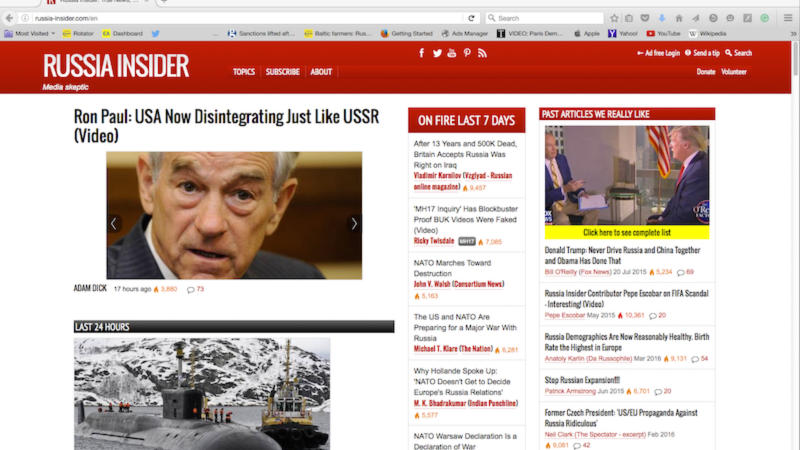
News or propaganda? The pro-Moscow Russia Insider is one of several highly visible partisan outlets alongside RT, Ruptly and Sputnik. By Russia Insider
A European Commission official has said that Russian propaganda was now powerful in all EU member states – but in some of them Moscow barely needed to make the effort, as local politicians were delivering its messages, Georgi Gotev wrote for EurActiv.com.
Speaking at a Brussels public event on the so-called “hybrid war” Russia is waging in Ukraine and other countries, Jakub Kalenski, a member of the European External Action Service task force assigned with studying Russian propaganda, said such disinformation was active in every European country.
In the Baltic countries, he said the target was the Russian-speaking population, via Russian TV channels.
But in the Visegrad countries – Poland, Czechia, Slovakia, and Hungary – he said the means of disinformation were different. There were, he said, dozens or even hundreds of disinformation websites. A Hungarian think tank counted some 100 of them, and there were some 70-80 in Czechia, and a similar number in Slovakia, he added.
In Scandinavia, he said tactics were different again, and their disinformation was done mostly by trolling. Internet trolls are people who sow discord by posting inflammatory comments under articles. Russian so-called ‘web-brigades’ consist of state-sponsored anonymous political commentators.
“And there are countries where you don’t even need media, because you have the politicians spreading the programmed messages for you”, he said.
Asked by EurActiv.com to name those countries, Kalenski replied: “I think you can find them yourself”.
He insisted that the Russian propaganda targeted not only the countries in Eastern Europe, but all European countries, and that the effort was achieving its goals.
Kalenski said that a representative of a Spanish think tank, which he didn’t name, told him that a majority of Spaniards believe that Russia is the victim of the aggressive West.
“Nobody had such privileged relations with the West as Russia. They were members of G8, they are members of WTO, their military personnel were in the NATO headquarters until very recently. If the relations deteriorated, it’s only their fault, but still a majority of Spanish society believes this disinformation”, the Commission official said. According to another source – which he did not name – 50% of people in France believed that Kyiv started the war in Eastern Ukraine.
Hybrid war ‘à la Russe’
Kalenski made the comments at a conference entitled “Russian hybrid war and politics in Europe”, organised by two Ukrainian think-tanks and the website EUtoday, which mostly covers news from Ukraine. No Russian representative attended the event.
Yuri Fedorov, a Ukrainian expert in Russian foreign and security policy and author of the book “Hybrid war à-la-Russe”, said that the hybrid war waged against his country is the first example of such warfare in history.
Fedorov argued that through disinformation, Russia conveyed the message that the Orthodox should remain loyal to Moscow, that Ukraine, Russia and Belarus were the same nation, and that as a result many Russians believed that the existence of an independent Ukraine was unacceptable.
“If Russian aggression in Ukraine is successful, it will be replicated in the Baltic countries and elsewhere”, he said.
Describing the current situation in eastern Ukraine, Fedorov said that the Ukrainian authorities had stopped the hybrid warfare in Kharkiv and in Odessa, and the Russian military was in a difficult situation in Donbas.
The Russian army is unable to move further without the massive use of aviation and traditional warfare – which is unacceptable for the Kremlin, he said.
Consequently, the new goal of Russia was that Ukraine changes its constitution, giving de facto veto power to the separatists and the ability to permanently destabilise the country. The EU should support Ukraine, because an unstable Ukraine would be “a nightmare” for the Union, he said.
The Minsk agreement (see background) provides for changes in the Ukraine constitution giving more autonomy for the separatist-held regions of Donetsk and Lugansk. However, Ukraine insists that changes in the constitution should come at the end of the process, when Ukraine would have regained sovereignty over these territories.
Yehor Bozhok, acting head of the Ukraine mission to NATO, said that Russia wanted “fake elections and legitimisation of terrorists”. “This is not in the Minsk agreement”, he added.
“Our goal is to achieve real ceasefire and real security on the ground, start preparation for local elections according to OSCE standards, with ODIHR (Office for Democratic Institutions and Human Rights) observation. That was the agreement achieved”, Bozhok said.
The Ukrainian diplomat said that NATO has been united in saying that before elections an absolute must is to create security conditions.
“But we do not see any sign of willingness from the Kremlin to implement what they subscribed”, he added.
Background
The leaders of Germany, France, Russia and Ukraine (the so-called Normandy format) gave their support to a deal to end fighting in eastern Ukraine, following 17-hour long negotiations in the Belarussian capital Minsk on 12 February 2015.
The four leaders committed to respecting Ukraine’s sovereignty and territorial integrity, according to a joint declaration.
Western leaders are closely observing the implementation of the Minsk agreement.
On 2 March 2015, European leaders said that they agreed that the OSCE needed a broader role as observers of the ceasefire, and weapons removal.
On 2 October 2015, the leaders of the Normandy format admitted that it would take time to organise elections in Ukraine that respect international standards and as a result, the so-called Minsk peace process would run into next year.
By Georgi Gotev, EurActiv.com





